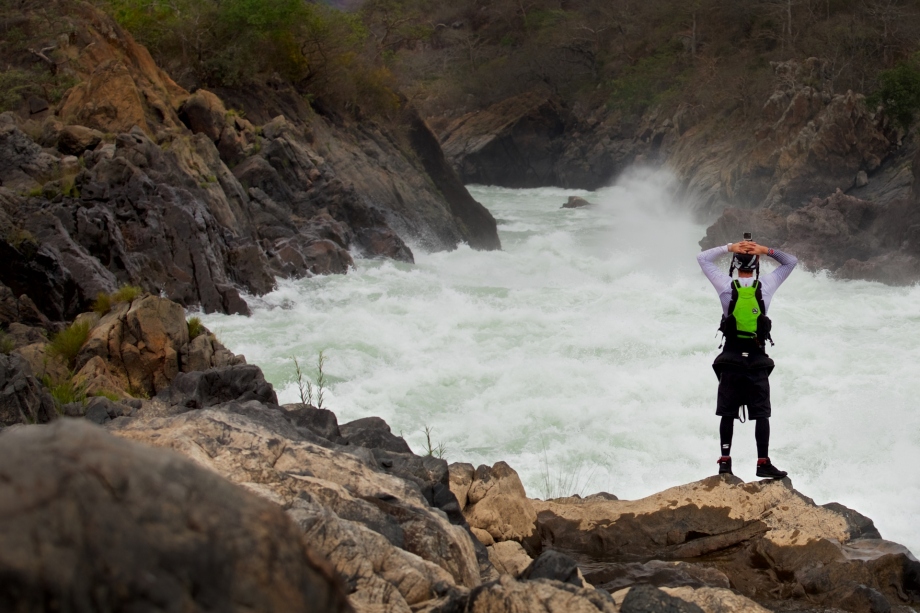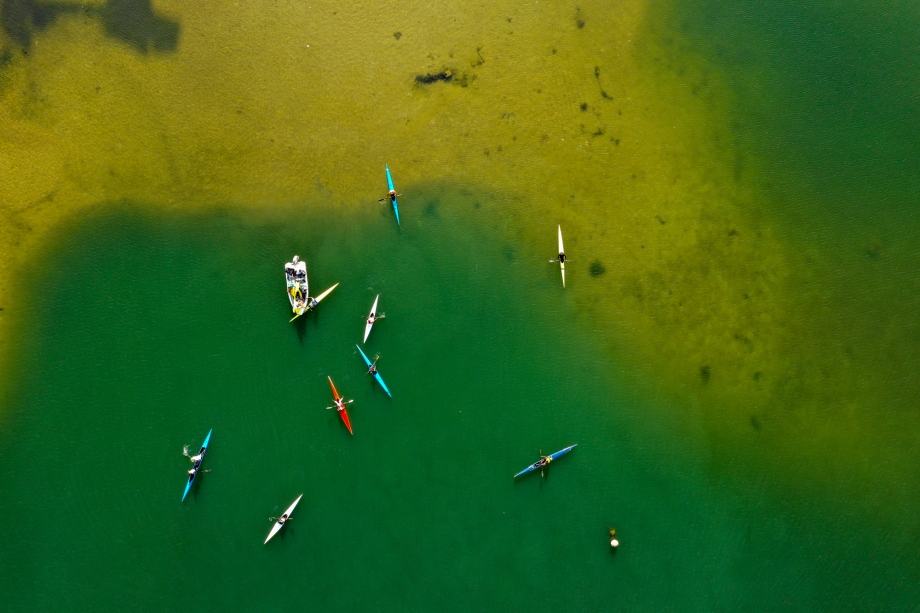INTERNATIONAL OLYMPIC COMMITTEE (IOC) CLEAN SEAS AMBASSADOR AND TWO-TIME CANOE SLALOM OLYMPIAN MIKE DAWSON BATTLED GUN-WAVING SOLDIERS, CROCODILES AND DANGEROUS RAPIDS TO COMPLETE A WHITEWATER DESCENT OF AFRICA'S FOURTH LARGEST RIVER LATE LAST YEAR.
DAWSON AND HIS TEAM USED THE OCCASION TO RAISE AWARENESS OF THE INTERNATIONAL CLEAN SEAS PROJECT, A COLLABORATION BETWEEN THE ICF, THE IOC AND UN ENVIRONMENT. IT WAS ACTION-PACKED ALL THE WAY. AS WE APPROACH THE ONE-YEAR ANNIVERSARY OF THE CLEAN SEAS PROJECT, WE LOOK BACK AT THE JOURNEY OF DAWSON AND HIS TEAM.
Angola's Kwanza River presents plenty of challenges for even the world's most experienced paddlers. New Zealand's Dawson joined South Africa's Dewet Michau and UK's Jake Holland set out to battle the treacherous rapids on Africa's west coast, and also to get a first-hand look at plastic pollution in along the waterway. Here's what they found..
Just months after competing in the ICF canoe slalom world championships, Dawson and the team successfully ran sections of the Kwanza River, which included crocodile-infested pools and seething 120-foot waterfalls, in an attempt to raise aweness regarding plastic in the worlds waterways.
The expedition team set out from Johannesburg in early November to traverse the lower half of the African continent, traveling through four countries before heading north and crossing from Namibia to Angola in search of the mysterious rapids of the Kwanza River.
Despite two previous unsuccessful attempts to conquer the river, including one by Mike Dawson himself due to the tricky geo-political situation around the Kwanza River, the team set out to attempt the gorge for a third time.
“This trip combined it all – adventure travel, extreme kayaking and environmental issues” Dawson said.
This ambitious expedition across Africa by the international team had alternative goals, with a large part of the expedition focused on working together with the Nautical Federation in Angola to encourage development of the canoe sports in West Africa, as well as educating and highlighting issues with plastic consumption globally.
After crossing the Angolan border, the team still had another two days of driving overland to reach the put in for the Keve River. The Keve is the Kwanza's lesser-known sister river and relatively uncharted. It boasted more gradient and a creeking style of paddling through remote gorges which made it the perfect training ground for preparing the team for the Kwanza descent. The trio finished the 80km section of river, with nearly 800m of gradient, over four days.

"The Keve River was extremely-isolated, with massive portages followed by endless sections of whitewater," Dawson said.
“It was an incredible river, and I enjoyed every second. What we noticed being so remote was the lack of pollution. In the headwaters of the Keve, there was no rubbish, but once we descended closer to civilisation we started to come across a lot of plastic in the water which highlights how reliant the world is on plastic.”
After successfully completing the descent the team packed up and headed north to the Kwanza River. The team arrived to intense scenes, there were police guns being waved around and a lot of military activity along the river.
“Almost immediately we were shut down and threatened with arrest if we didn’t leave the river area.” Dawson says.
“We were quite intimidated and spent the next two days negotiating with the military to even get access to the river in the first place.”
The Kwanza is the main economic corridor of Angola fueling it’s hunger for energy to develop and rebuild the infrastructure as well as exporting its natural resources abroad.
The team was faced with the decision of sneaking onto the river and most likely being arrested and deported or abandoning the descent.
“The run in with the military definitely changed the dynamic and we had to make a decision as a group knowing that there could be some serious consequences for ignoring the authorities,” Dawson said.
But out of nowhere the expedition team was thrown a lifeline by the Angolan Olympic Committee two days later, who arranged permits granting access to certain sections of the Kwanza River.
Things weren't all smooth sailing on the water however. The first day was intense.
"We'd hit one section of some fairly croc-infested water, so decided to try take a smaller channel around it but ended up dropping into a nasty drop blind," Dawson said. In the end two of the team swam and the exhausted trio made it to the end of day one.
The next day, we made an early start - quick Radix breakfast before packing up and getting on the river. The cooler morning temperatures meant less crocodile activity. The river throws endless challenges. If it’s not a giant rapid to run or portage, it’s a seemingly endless flat stretch or a wild storm raging in over the highlands. When you get multiple crocodile charges in an hour, it’s pretty scary.
“There were big reality checks on this trip. Intense moments and sometimes we had to sit back and really think 'why am I doing this',” Dewet said.
“You learn a lot about yourself being out there on a journey in the outback of Africa.”
"Time and time again we found ourselves discussing if it was the right decision to get on the water. We were hyper-alert nonstop, constantly on the lookout to notice any sign of danger or movement.”
Eventually, the team reached the takeout – Ponte Kwanza – in one piece.
Following the successful descent the team traveled to Luanda to spend time with the local Angola Kayak Federation to share stories from the expedition.
“It was a highlight to end my trip in Angola, meeting these Angolan athletes and training together in Luanda Bay,” Holland said.
“To share a little bit of our story, and see them so fired up to check out whitewater is inspiring. Hopefully their progression is going to keep continuing that way and we will see the boys ripping it up in a few years.”





